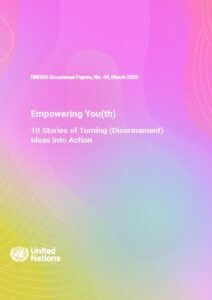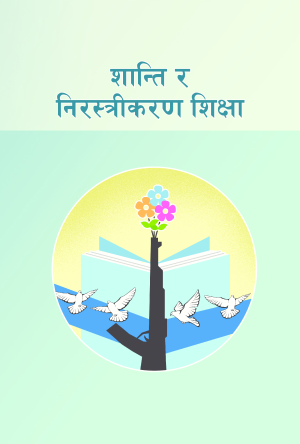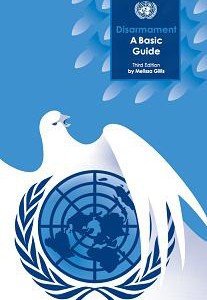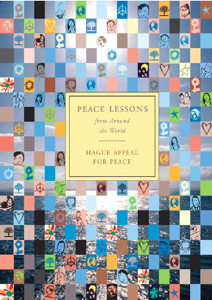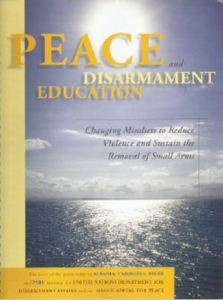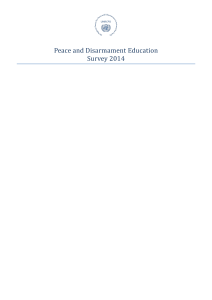Peace and Disarmament Education
UNRCPD is committed to assisting Asia-Pacific states requesting support in delivering Peace and Disarmament education.
Executive Summary – Baseline Assessment for Disarmament Education in Asia and the Pacific
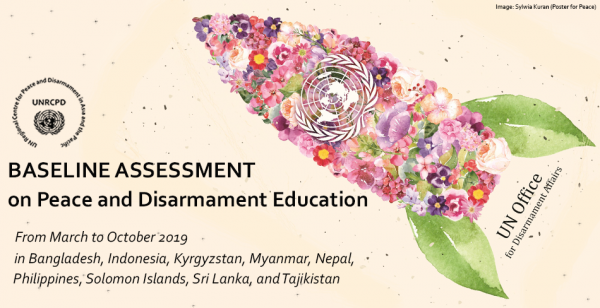
The United Nations Study on Disarmament and Non-Proliferation Education (A/57/124) was submitted to the First Committee of the General Assembly at its 57th session on 9 October 2002. The Study builds upon and seeks to revitalize past disarmament education efforts, which it considered an integral part of peace education. Its main contribution was the 34 recommendations for action to be undertaken by Member States, UNODA and its regional centres and others. In July 2017, these 34 recommendations were reaffirmed in the Report of the Secretary-General on the Work of the Advisory Board on Disarmament Matters (A/72/185). It calls for a reinvigoration of disarmament education activities.
In May 2018, the Secretary-General’s Agenda for Disarmament was launched in which he underscored the importance of education and training opportunities in order to create a platform for the sustainable entry of young women and men from all parts of the world into the field of disarmament. The project responds to action 38 of the Disarmament Agenda to:
1) Develop a programme to create a cadre of youth fellows from around the world, who will work assiduously to promote disarmament, non-proliferation and arms control in their communities;
2) Engage with youth groups and community organizations in support of the implementation of the Sustainable Development Goals with synergistic linkages to youth, disarmament and non-proliferation education and conflict prevention; and
3) Develop disarmament and non-proliferation training modules hosted on the online dashboard of the Office for Disarmament Affairs (Vienna Office) targeting young diplomats and other youth leaders for knowledge enhancement and capacity-building.
In support of and in line with the above mandates and frameworks, the United Nations Regional Centre for Peace and Disarmament in Asia and the Pacific (UNRCPD) is conducting a Baseline Assessment of peace and disarmament education (PDE) needs in select States in Asia-Pacific. The Baseline Assessment is the first phase of developing a more comprehensive PDE programme with the results guiding specific activities.
The project aims to realize Sustainable Development Goals (SDG) 4.7 on quality education promoting a culture of peace and non-violence. SDG 5.5, ensuring women’s full and effective participation and equal opportunities for leadership at all levels of decision making in political, economic and public life. Furthermore, outcomes of the project will contribute to Target 16.7 on ensuring responsive, inclusive, participatory and representative decision-making at all levels. The project lays the foundation for future activities coming out of the assessment to directly support Member States in addressing SDG Target 16.1 on significantly reducing all forms of violence and related death rates everywhere and Target 16.4 reducing illicit arms flows.
***Executive Summary of the Baseline Assessment now available***:
Executive Summary – Baseline Assessment for Disarmament Education in Asia and the Pacific
UNODA/RCPD engaging the Next Generation of Leaders at HUFS, ROK
Ms. Radha Day, Chief of Regional Disarmament and Information Outreach Branch of the United Nations Office for Disarmament Affairs, visited Hankuk University of Foreign Studies during her trip to Korea for the 23rd ROK-UN Joint Conference on Disarmament and Non-Proliferation Issues.
She engaged with students, sharing insights on the importance of peace and disarmament, the role of youth in global initiatives and career opportunities at the UN.👏
She emphasized the crucial role of youth participation in promoting peace and disarmament. We extend our heartfelt thanks to Hankuk University of Foreign Studies for hosting us and providing the opportunity to engage with the future leaders of the Republic of Korea.
2024 Edition of the Disarmament Toolkit (June 2023)
From 21 to 30 June 2024, UNRCPD co-hosted the second edition of the online course “Disarmament Toolkit” in collaboration with the Prajnya Trust. The course covered themes such as gender and disarmament, Weapons of Mass Destruction (WMD), Sustainable Development Goals, and youth empowerment. Participants included students, academics, civil society professionals, and international practitioners.
International Day of Peace 2023: Nurturing the tomorrow’s leaders in The British School, Kathmandu
To mark the International Day of Peace on 21 September 2023, UNRCPD visited The British School in Kathmandu to deliver a guest lecture to students. The session focused on the role of disarmament and arms control in building sustainable peace and empowered young participants to engage with global peace and security issues.
Kathmandu, 06 November (UNRCPD): The 14th annual International Youth Media Summit (IYMS) concluded its conference producing short Public Service Announcement (PSA) films, created by the 70 young filmmakers (ages 14 to 24) from 30 nations which were produced over 14 days on seven major global issues: Health, Poverty, Youth Empowerment, Violence, Discrimination, Environment, Women’s Rights. These PSA short films, along with developed outreach workshop guides ensures delegates are able to effectively raise awareness upon returning to their home country. The PSAs will be shown to more than one million young people in schools, colleges, libraries and community centers around the world.
The United Nation Regional Centre for Peace and Disarmament in Asia and the Pacific (UNRCPD) sponsored three International Youth Delegates from Myanmar, the Philippines, and Sri Lanka and two National Youth Delegates from Nepal. Other delegates at the 2019 IMYS conference came from Afghanistan, Australia, Croatia, Egypt, Hong Kong, Israel, Italy, Lebanon, Malaysia, Mexico, Nigeria, Pakistan, Qatar, Sweden, United Arab Emirates, and the United States of America.
UNRCPD’s peace and disarmament education coordinator, Jane E. Lawson, mentored the Violence Issue Group Mentor helping youth delegates understand the push and pull factors to armed violence and violent extremism and how important it is to consider broader concepts of peace and security when looking at conflict prevention. As a result the Violence Issue Group developed this short PSA entitled PATHWAYS:
UNRCPD remains committed to peace and disarmament education activities working with youth as a means to motivate each other to take action and responsibility to insure their generation can shape the world. “If you want to improve the world, you have to be the media, learn the language and use it, “said Chairman of the IYMS Advisory Board, Birgitta Olsson. IYMS will be presenting this year’s Violence PSA at the Youth Agenda Forum in Gothenburg, Sweden later in September.
Other organizations that supported the Summit include the Film Development Board of Nepal, Nepal Tourism Board Visit Year 2020, as well as several United Nations organizations such as UNICEF, UNDP, UNFPA, UNESCO, and UN Women.
UNRPCD and the Youth Delegates shared the PSA videos to educational institutions in the Kathmandu valley showcasing the power of media for advocacy and education to combat violence. Over 120 students aged 12 to 25 and their teachers participated in the events which took place over two days.
The 2020 Summit will be held in Croatia. https://www.iyms.org/
To mark the International Day of Peace 2018, UNRCPD presents a video which highlights the important role youth have in arms control, disarmament and peace education. We celebrate the Right to Peace.
Peace and Disarmament Education in the UN System
In line with UNRCPD’s mandate and General Assembly resolutions recommending implementation of disarmament and non-proliferation education (e.g. A/69/65, A/69/113), UNRCPD’s Peace and Disarmament Education activities seek to shape the values, skills and behavior of students towards non-violent responses to conflict at the individual, national and global levels. To see the range of materials available in the UNODA collection, please visit UNODA’s Disarmament Education Resources for Learning and UNODA Education – Reports of the Secretary General.
Education plays a vital role to develop a culture of peace.— Mr. Mahesh Paudel, Nepali School Principal
Related Activities
Peace and Disarmament Education Programme in Nepal (2013-2015)
Art for Peace Competition (2012-2014)
Volunteers for Peace Education (2011)
Featured Publications
